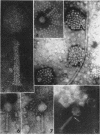Abstract
Frampton, E. W. (The University of Texas M. D. Anderson Hospital and Tumor Institute, Houston), and B. R. Brinkley. Evidence of lysogeny in derivatives of Escherichia coli. J. Bacteriol. 90:446–452. 1965.—Exposure of cultures of several thymine-requiring derivatives of Escherichia coli strain 15 to radiation [X rays or ultraviolet (UV)] resulted in an increased synthesis of ribonucleic acid (RNA) as measured by the incorporation of radioactive uridine. In addition to radiation, mitomycin C (5 or 25 μg/ml) or growth in the absence of thymine also stimulated RNA synthesis in cultures in which the bulk of RNA synthesis was terminated by a shift-down in growth conditions. RNA purified from X-irradiated bacteria was resolved on columns of methylated serum albumin and yielded an elution profile which appeared similar to RNA synthesized by phage-infected bacteria. Electron microscopic examination of cultures induced to lyse by exposure to UV radiation, or by growth in the presence of 5-bromouracil before exposure to radiation (X rays or UV), showed the presence of mostly incomplete phage particles.
Full text
PDF






Images in this article
Selected References
These references are in PubMed. This may not be the complete list of references from this article.
- ARBER W., KELLENBERGER G. Study of the properties of seven defective-lysogenic strains derived from Escherichia coli K12 (lambda). Virology. 1958 Jun;5(3):458–475. doi: 10.1016/0042-6822(58)90039-4. [DOI] [PubMed] [Google Scholar]
- BRADLEY D. E. THE STRUCTURE OF SOME BACTERIOPHAGES ASSOCIATED WITH MALE STRAINS OF ESCHERICHIA COLI. J Gen Microbiol. 1964 Jun;35:471–482. doi: 10.1099/00221287-35-3-471. [DOI] [PubMed] [Google Scholar]
- BRENNER S., HORNE R. W. A negative staining method for high resolution electron microscopy of viruses. Biochim Biophys Acta. 1959 Jul;34:103–110. doi: 10.1016/0006-3002(59)90237-9. [DOI] [PubMed] [Google Scholar]
- DIGIROLAMO A., HENSHAW E. C., HIATT H. H. MESSENGER RIBONUCLEIC ACID IN RAT LIVER NUCLEI AND CYTOPLASM. J Mol Biol. 1964 Apr;8:479–488. doi: 10.1016/s0022-2836(64)80005-x. [DOI] [PubMed] [Google Scholar]
- FRAMPTON E. W. SYNTHESIS OF RIBONUCLEIC ACID BY X-IRRADIATED BACTERIA. J Bacteriol. 1964 Jun;87:1369–1376. doi: 10.1128/jb.87.6.1369-1376.1964. [DOI] [PMC free article] [PubMed] [Google Scholar]
- Fredericq P. On the nature of colicinogenic factors: a review. J Theor Biol. 1963 Mar;4(2):159–165. doi: 10.1016/0022-5193(63)90024-9. [DOI] [PubMed] [Google Scholar]
- HANAWALT P. C. Involvement of synthesis of RNA in thymineless death. Nature. 1963 Apr 20;198:286–286. doi: 10.1038/198286a0. [DOI] [PubMed] [Google Scholar]
- HAYASHI M., SPIEGELMAN S. The selective synthesis of informational RNA in bacteria. Proc Natl Acad Sci U S A. 1961 Oct 15;47:1564–1580. doi: 10.1073/pnas.47.10.1564. [DOI] [PMC free article] [PubMed] [Google Scholar]
- ISHIHAMA A., MIZUNO N., TAKAI M., OTAKA E., OSAWA S. Molecular and metabolic properties of messenger RNA from normal and T2-infected Escherichia coli. J Mol Biol. 1962 Sep;5:251–264. doi: 10.1016/s0022-2836(62)80069-2. [DOI] [PubMed] [Google Scholar]
- KANAZIR D., BARNER H. D., FLAKS J. G., COHEN S. S. Some physiological and genetic properties of a strain of Escherichia coli requiring thymine, arginine and uracil. Biochim Biophys Acta. 1959 Aug;34:341–353. doi: 10.1016/0006-3002(59)90287-2. [DOI] [PubMed] [Google Scholar]
- KANO-SUEOKA T., SPIEGELMAN S. Evidence for a nonrandom reading of the genome. Proc Natl Acad Sci U S A. 1962 Nov 15;48:1942–1949. doi: 10.1073/pnas.48.11.1942. [DOI] [PMC free article] [PubMed] [Google Scholar]
- MUKAI F. H. Interrelationship between colicin sensitivity and phage resistance. J Gen Microbiol. 1960 Dec;23:539–551. doi: 10.1099/00221287-23-3-539. [DOI] [PubMed] [Google Scholar]
- Mennigmann H. D. Induction in Escherichia coli 15 of the colicinogenic factor by thymine-less death. Biochem Biophys Res Commun. 1964 Jul 1;16(4):373–378. doi: 10.1016/0006-291x(64)90043-9. [DOI] [PubMed] [Google Scholar]
- RYAN F. J., FRIED P., MUKAI F. A colicin produced by cells that are sensitive to it. Biochim Biophys Acta. 1955 Sep;18(1):131–131. doi: 10.1016/0006-3002(55)90016-0. [DOI] [PubMed] [Google Scholar]
- SANDOVAL H. K., REILLY H. C., TANDLER B. COLICIN 15: POSSIBLY A DEFECTIVE BACTERIOPHAGE. Nature. 1965 Jan 30;205:522–523. doi: 10.1038/205522a0. [DOI] [PubMed] [Google Scholar]
- SUEOKA N., CHENG T. Y. Fractionation of nucleic acids with the methylated albumin column. J Mol Biol. 1962 Mar;4:161–172. doi: 10.1016/s0022-2836(62)80048-5. [DOI] [PubMed] [Google Scholar]
- WEATHERWAX R. S., LANDMAN O. E. Ultraviolet light-induced mutation and deoxyribonucleic acid synthesis in Escherichia coli. J Bacteriol. 1960 Oct;80:528–535. doi: 10.1128/jb.80.4.528-535.1960. [DOI] [PMC free article] [PubMed] [Google Scholar]




